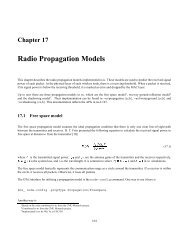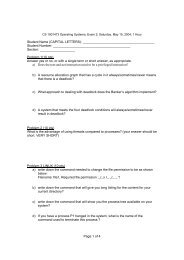Progress report - The University of Jordan
Progress report - The University of Jordan
Progress report - The University of Jordan
Create successful ePaper yourself
Turn your PDF publications into a flip-book with our unique Google optimized e-Paper software.
Interim UNESCO Chairs Programme<br />
<strong>Progress</strong> <strong>report</strong><br />
Period <strong>of</strong> activity: 01/01/2004-31/12/2005<br />
Title <strong>of</strong> the UNESCO Chair or Network:<br />
UNESCO/EOLSS Chair in Wadi Hyrdology<br />
Report established by: Pr<strong>of</strong>. Muhammad. R. Shatanawi<br />
Function / Title: Chair holder<br />
Pr<strong>of</strong>essor <strong>of</strong> Water Resources<br />
<strong>University</strong> <strong>of</strong> <strong>Jordan</strong><br />
Summary<br />
Page<br />
I. Address (if modified) 2<br />
II. Available resources 3<br />
A. Human resources 3<br />
B. Material resources 3<br />
III. Activities 3<br />
A. Research 3<br />
B. Seminars 8<br />
C. Training course 8<br />
D. Conferences and Workshops 8<br />
E. Missions 9<br />
IV. Impact 10<br />
V. Forthcoming Activities 11<br />
VI.<br />
Annexes
I. Address<br />
Name:<br />
Function/Title:<br />
<strong>University</strong>/Institution:<br />
Faculty/Department/Centre:<br />
P.O.Box:<br />
Street:<br />
Postal Code:<br />
City :<br />
Province:<br />
Country:<br />
Phone :<br />
Fax:<br />
E-mail:<br />
Web Site :<br />
Address <strong>of</strong> the<br />
Host Institution<br />
<strong>University</strong> <strong>of</strong> <strong>Jordan</strong><br />
Amman<br />
<strong>Jordan</strong><br />
Address <strong>of</strong> the<br />
Chair holder<br />
(or coordinator)<br />
Pr<strong>of</strong> Muhammad Shatanawi<br />
UNESCO Chair Holder<br />
<strong>Jordan</strong> <strong>University</strong><br />
Faculty <strong>of</strong> Agriculture<br />
13042<br />
Queen Rania street<br />
11942<br />
Amman<br />
Amman<br />
<strong>Jordan</strong><br />
962 777 48 44 99 ,<br />
962-6-5355000/2580<br />
962-6-5355577<br />
shatanaw@ju.edu.jo<br />
www.ju.edu.jo,<br />
http://web.ju.edu.jo/wadihydrology<br />
2
II.<br />
Available resources<br />
Please specify for each item, when available, total cost and funding sources<br />
(for guidelines see Annex 3)<br />
A. Human resources<br />
1. For the administration <strong>of</strong> the UNESCO Chair<br />
• Pr<strong>of</strong>. M. R. Shatanawi, Chair holder <strong>of</strong> the Wadi Hydrology<br />
• Ms. Sawsan Naber, Chair administrative and information <strong>of</strong>ficer<br />
2. For the teaching/training/ research activities:<br />
• One Ph.D in hydrology, Two Ph.D. in GIS and remote sensing working on<br />
different projects <strong>of</strong> the Chair.<br />
• Five research assistants working on GIS.<br />
B. Material resources<br />
• Computers, printers, and scanners.<br />
• GIS facilities and s<strong>of</strong>tware.<br />
• Automatic Weather Station.<br />
• Field Equipment.<br />
III.<br />
Activities<br />
A. Research<br />
1. Characterization <strong>of</strong> Wadi Systems in <strong>Jordan</strong>.<br />
a. In order to characterize the Wadi system in <strong>Jordan</strong>, the different 15 surface<br />
basins have been identified with respect to area, volume <strong>of</strong> run<strong>of</strong>f, and<br />
drainage outlets. <strong>The</strong>se basins can be classified under two categories;<br />
basin that drain their water westward ending in the Dead Sea and basin<br />
that drain its water into desert Mudflat (Qa’a). Most <strong>of</strong> the water courses in<br />
these wadis are dry creeks. Attached (Annex I) a description <strong>of</strong> the Basins<br />
classified according to their drainage outlet.<br />
b. Zerqa River basin is under investigation with respect to optimization <strong>of</strong><br />
water resources under the activities <strong>of</strong> OPTIMA project which is funded by<br />
the European Commission under contract No.: 509091. <strong>The</strong> following<br />
outcomes have been achieved:<br />
• <strong>The</strong> boundary <strong>of</strong> the basin has been delineated<br />
• <strong>The</strong> basin has been subdivided into the following sub-basin: Sail Amman,<br />
Wadi Dhuliel, Jerash, Wadi Rmaimein, Wadi el-Kittih and other small<br />
wadies. Wadi Dhuliel sub-basin representing the arid land conditions will be<br />
studied in details by dividing it into third level catchments. Catchments at<br />
these level have been characterized using WMS models.<br />
• Land use maps have been prepared<br />
• Data concerning rainfall from 4 stations have been collected as well as<br />
run<strong>of</strong>f reading from Jarash gauging station.<br />
• Surface water resources, groundwater wells and wastewater treatment<br />
plants have been identified and put into GIS format.<br />
3
• Major population centers have been located and put as a layer in GIS<br />
format.<br />
• A progress <strong>report</strong> on characterization <strong>of</strong> Zarqa River basin has been<br />
prepared (Annex II).<br />
2. Sustainable Management <strong>of</strong> Scare Resources in Coasted Areas (SMART).<br />
Expected results:<br />
• Policy guidelines for the management <strong>of</strong> water resources in Aqaba.<br />
• Develop models to optimize the use <strong>of</strong> water resources.<br />
• Develop a set <strong>of</strong> social and technical indicators<br />
• Utilize hydrodynamic models to predict the effect <strong>of</strong> wind, tides and point<br />
source pollution on sea water movement.<br />
Target group:<br />
• Public administration and decision makers.<br />
• Researchers.<br />
• Funding agencies.<br />
• Aqaba Special Economic Zone Authority.<br />
Partnership:<br />
• <strong>University</strong> <strong>of</strong> <strong>Jordan</strong>, Amman, <strong>Jordan</strong><br />
• Marine Science Station, Aqaba, <strong>Jordan</strong><br />
• Aqaba Special Economic Zone Authority<br />
• Institutions from Portugal, France, Austria, Turkey, Egypt, Lebanon, <strong>Jordan</strong><br />
and Tunisia<br />
Geographic Coverage: <strong>The</strong> Coastal area <strong>of</strong> the Mediterranean.<br />
Funding Sources:<br />
<strong>The</strong> European Commission<br />
Output:<br />
• Final <strong>report</strong> (See Annex III).<br />
• Website for the project<br />
• Dissemination plan in conferences and papers<br />
3. Improved Management Tools for Water-Limited Irrigation (IRRIMED)<br />
Expected results:<br />
• Integrated information system for irrigated agriculture in the <strong>Jordan</strong> Valley.<br />
• Establish a set <strong>of</strong> data in reference evapotranspiration over selected crop.<br />
• Derive maps <strong>of</strong> ETR from high resolution satellite images using simple and<br />
robust s<strong>of</strong>tware to estimate ETR.<br />
Target group:<br />
• Irrigation engineers<br />
• Farmers<br />
• Researchers<br />
• Decision makers<br />
4
Partnership:<br />
• <strong>University</strong> <strong>of</strong> <strong>Jordan</strong>, Amman, <strong>Jordan</strong><br />
• National Center for Agriculture Research and Technology Transfer<br />
(NCARTT)<br />
• <strong>The</strong> Ministry <strong>of</strong> Water and Irrigation, Amman, <strong>Jordan</strong><br />
• Institutions from: France, Netherlands, Morocco, Tunisia, Lebanon and<br />
Syria.<br />
Geographic Coverage: <strong>Jordan</strong> Valley.<br />
Funding Sources:<br />
<strong>The</strong> European Commission<br />
Output:<br />
• <strong>Progress</strong> Reports (Annex IV).<br />
• Final <strong>report</strong><br />
• Website for the project<br />
• Brochure<br />
• S<strong>of</strong>tware development<br />
4. Optimization <strong>of</strong> Sustainable Water Resources Management (OPTIMA).<br />
Expected results:<br />
• Developing the objectives, criteria and constraints in close cooperation with<br />
stakeholders and actors in an interactive approach, with emphasis to socioeconomic<br />
structures and gender where feasible and scientifically meaningful;<br />
• Using a full-featured dynamic and distributed simulation model and genetic<br />
programming as the core to generate feasible and non-dominated<br />
alternatives. Water technology alternatives including their cost structure, and<br />
up-to-date remote-sensing derived land use information are primary inputs;<br />
• Extending the set <strong>of</strong> objectives, criteria and constraints through expert<br />
systems technology to include, difficult to quantify, environmental and social<br />
dimensions;<br />
• Putting specific emphasis on local acceptance and implementation through<br />
the inclusion <strong>of</strong> stake-holders in an interactive, participatory decision making<br />
process carefully embedded in institutional structures, using a discrete multicriteria<br />
reference point methodology. <strong>The</strong> formal approach provides a<br />
rational basis for policy and decision making, empowerment and legitimacy<br />
through information;<br />
• Comparative evaluation and benchmarking across the set <strong>of</strong> local and<br />
regional case studies in 7 countries, namely Cyprus, Turkey, Lebanon,<br />
<strong>Jordan</strong>, Palestine, Tunisia, and Morocco around the Southern and Eastern<br />
Mediterranean.<br />
Target group:<br />
• Public administration and decision makers.<br />
• Ministry <strong>of</strong> Water and irrigation.<br />
• Researchers.<br />
Partnership:<br />
• <strong>University</strong> <strong>of</strong> <strong>Jordan</strong>, Amman, <strong>Jordan</strong><br />
• Institutions from Austria, Turkey, Italy, Greece, Cyprus, Palestine, Lebanon,<br />
Morocco, Tunisia and <strong>Jordan</strong>.<br />
5
Geographic Coverage:<br />
Selected river basins in the Mediterranean region.<br />
Funding Sources:<br />
<strong>The</strong> European Commission<br />
Output:<br />
• Identification <strong>of</strong> problem issues (Summary Report)<br />
• Guidelines for the socio-economic analysis: issues and indicators<br />
• Land use data <strong>report</strong><br />
• Zarqa River: Problem analysis<br />
• Zarqa River: Optimisation results<br />
• <strong>Progress</strong> Reports<br />
• Final <strong>report</strong><br />
• Website for the project<br />
• Dissemination plan in conferences and papers<br />
•<br />
5. Deficit Irrigation in Mediterranean Agriculture (DIMAS).<br />
Expected results:<br />
• Development <strong>of</strong> a simulation model for DI design and for yield prediction in<br />
water-limited situations.<br />
• Validation <strong>of</strong> the simulation model using experiments with the various crops<br />
and in participants countries.<br />
• Generation <strong>of</strong> DI recommendations for farmers and water managers that will<br />
reduce water use for irrigation in participants countries.<br />
• Characterization <strong>of</strong> current DI situations in participants countries and<br />
document farmers’ performance and the limitations <strong>of</strong> existing irrigation<br />
networks.<br />
• Assess the economic viability <strong>of</strong> DI for the various crops, environments, and<br />
water delivery methods in participants countries. For this, the DI simulation<br />
model will be coupled with an optimisation module for economic analysis.<br />
• Evaluate the social acceptability <strong>of</strong> DI and the institutional and cultural<br />
features that are needed for the dissemination and acceptance <strong>of</strong> DI.<br />
• Integrate DI strategies into the management <strong>of</strong> irrigation water at the<br />
watershed, irrigation district, and farm levels.<br />
Target group:<br />
• Farmers.<br />
• Irrigation engineers.<br />
• Decision makers at the Ministry <strong>of</strong> Water and Irrigation.<br />
• Ministry <strong>of</strong> Agriculture <strong>of</strong>ficials.<br />
Partnership:<br />
• <strong>University</strong> <strong>of</strong> <strong>Jordan</strong>, Amman, <strong>Jordan</strong>.<br />
• <strong>Jordan</strong> Valley Farmers Association.<br />
• National Research Center for Agricultural Research and Technology<br />
Transfer.<br />
• Institutions from Spain, Italy, Greece, Turkey, Morocco, Tunisia and <strong>Jordan</strong>.<br />
6
Geographic Coverage:<br />
Irrigated areas in the Mediterranean regions.<br />
Funding Sources:<br />
<strong>The</strong> European Commission<br />
Output:<br />
• <strong>Progress</strong> Reports and Final <strong>report</strong><br />
• Website for the project<br />
• Models <strong>of</strong> DI.<br />
6. Water Saving in Mediterranean Agriculture (WASAMED).<br />
Expected results:<br />
• To improve regional co-ordination <strong>of</strong> present and future actions in water<br />
saving.<br />
• To establish a Mediterranean-wide convention to strengthen communication<br />
and sharing <strong>of</strong> experience among relevant researchers, decision and policy<br />
makers, and end-users<br />
• To develop water saving research projects and actions that meet with the<br />
needs and concerns arising from the different Mediterranean contexts<br />
• To facilitate access <strong>of</strong> different stakeholders to an easy-to-use knowledgebase<br />
• To create a framework and seek consensus to assist regional planning and<br />
EU-funding in water resources management for the Mediterranean Region<br />
Target group:<br />
• Irrigation and Extension agents.<br />
• Decision makers at MWI and MoA.<br />
• Researchers.<br />
• Funding agencies.<br />
Partnership:<br />
• <strong>University</strong> <strong>of</strong> <strong>Jordan</strong>, Amman, <strong>Jordan</strong><br />
• <strong>Jordan</strong> Valley Farmers’ Association and NCARTT<br />
• 42 Institutions from <strong>Jordan</strong>, Italy, Syria, Lebanon, Morocco, Egypt, Portugal,<br />
Spain, Greece, Cyprus, Turkey, France, Germany and Algeria.<br />
Geographic Coverage:<br />
Mediterranean region.<br />
Funding Sources:<br />
<strong>The</strong> European Commission<br />
Output:<br />
• Electronic newsletters<br />
• <strong>The</strong>matic Video-CDs<br />
• International Conference on Water Saving in Mediterranean Agriculture.<br />
• Final <strong>report</strong><br />
• Website for the project<br />
7
B. Seminars<br />
1. A seminar about the WSSD and MDGs was given by Dr. Shatanawi at the<br />
<strong>University</strong> <strong>of</strong> <strong>Jordan</strong>. <strong>The</strong> seminar introduces the objectives <strong>of</strong> the World Water<br />
Assessment Report and explains to the audience the Millennium Development<br />
Goals as related to water. <strong>The</strong> audience represents the <strong>University</strong> <strong>of</strong> <strong>Jordan</strong>,<br />
Ministry <strong>of</strong> Water and Irrigation and the National Canter <strong>of</strong> Agricultural Research<br />
and Technology Transfer.<br />
2. Another seminar was held at the Ministry <strong>of</strong> Water and Irrigation after the<br />
national celebration <strong>of</strong> the World Water Day (March 22, 2005). <strong>The</strong> celebration<br />
<strong>of</strong> the WWD includes speaches by Minister <strong>of</strong> Water Irrigation, the UNESCO<br />
Chair (Dr. Shatanawi) and a representative from the NGO’s<br />
C. Training Courses<br />
1. A training course was held during the third week <strong>of</strong> March (20-25, 2005) which<br />
coincides with the world water day (March 22). Participation from the Ministry <strong>of</strong><br />
Water and Irrigation and the Ministry <strong>of</strong> Agriculture have attended the course.<br />
2. <strong>The</strong> ninth international course on Wadi Hydrology was held this year at Al-<br />
Balqa’ Applied <strong>University</strong>, <strong>Jordan</strong> (June 20-25, 2005). <strong>The</strong> theme <strong>of</strong> this course<br />
was about integrated water resources management in wadis using DDS.<br />
D. Conferences and Workshops<br />
1. International Conference on Water Use Efficiency and Water Productivity<br />
(1- 4 October, 2005)<br />
Expected results:<br />
• Create awareness among water users and decision makers about water<br />
saving technology in <strong>Jordan</strong> and the Mediterranean region.<br />
• Exchange <strong>of</strong> experience among different countries in the Mediterranean<br />
region.<br />
• Establish guidelines and procedures about efficient use <strong>of</strong> water in the<br />
Mediterranean countries.<br />
• Present the finding <strong>of</strong> research and the experience <strong>of</strong> participating countries<br />
in WUE and Water Productivity and key note speakers.<br />
Target group:<br />
• Farmers<br />
• Irrigation extension agents<br />
• Water resources engineers.<br />
Partnership:<br />
• <strong>University</strong> <strong>of</strong> <strong>Jordan</strong><br />
• Mediterranean Agronomic Institute in Bari, Italy.<br />
Geographic Coverage:.<br />
About 42 institutions (representing universities, government agencies and private<br />
sector organizations) from 14 Mediterranean countries.<br />
8
Funding Sources:<br />
European Commission<br />
Output:<br />
• A book <strong>of</strong> proceedings <strong>of</strong> Abstracts.<br />
• Conference proceedings (CD and hardcopy).<br />
2. A National Workshop on Aquifer Vulnerability and Risk in <strong>Jordan</strong> (28<br />
September, 2005).<br />
Expected results:<br />
• Expose the participants to the importance <strong>of</strong> protecting groundwater<br />
resources.<br />
• Explain the articles and items <strong>of</strong> the Groundwater Protection By-Law.<br />
• Introduce the new Unit at the MWI concerning groundwater protection.<br />
Target group:<br />
• Decision makers from MWI.<br />
• Members <strong>of</strong> some national NGO’s.<br />
• Pr<strong>of</strong>essors and researchers from different <strong>Jordan</strong>ian universities.<br />
Partnership:<br />
• Hashemite <strong>University</strong>.<br />
• UNESCO Chair in Wadi Hydrology<br />
• <strong>The</strong> National IHP Committee.<br />
• Ministry <strong>of</strong> Water and Irrigation<br />
Geographic Coverage:.<br />
<strong>Jordan</strong><br />
Funding Sources:<br />
UNESCO Office, Amman<br />
Output:<br />
• Workshop <strong>report</strong>.<br />
• Copies <strong>of</strong> presented papers<br />
E. Missions<br />
1. Participated in the 7 th International Cannes Water Symposium (Cannes, France,<br />
27 June–1 July, 2005). A paper was presented entitled “Management <strong>of</strong> Future<br />
Water Supply and Demand for Aqaba City in <strong>Jordan</strong>” by Muhammad Shatanawi,<br />
Ghada Naber and Sawsan Naber<br />
2. Participated in the Second Mediterranean Conference <strong>of</strong> Water Resources in<br />
Mediterranean Basin -WATMED2 (Marrakech, Morocco, Nov. 14-17, 2005). A<br />
paper was presented entitled “Watershed Management <strong>of</strong> Zarqa River Basin in<br />
<strong>Jordan</strong>” by Muhammad Shatanawi and Sawsan Naber.<br />
3. Participated in the Second Regional Consultation Workshop for Preparation <strong>of</strong><br />
the MENA Region <strong>report</strong> to the 4WWF in Mexico, March 2006. (Cairo, Egypt,<br />
December 14 -15, 2005). <strong>The</strong> objectives <strong>of</strong> the meeting are to discuss the draft<br />
regional document and input for ministerial declaration; present and discuss the<br />
9
contentt and structure <strong>of</strong> the thematic session program; present the first draft to<br />
the MENA water <strong>report</strong> by the World Bank; discuss the AWC regional day events;<br />
and discuss the role <strong>of</strong> the regional committee and logistic for participation in the<br />
4WWF.<br />
IV. Impact<br />
<strong>The</strong> main objective <strong>of</strong> the chair holder is the advancement <strong>of</strong> scientific knowledge<br />
related to Wadi system in the Arab States through scientific research and training.<br />
Other objectives are to raise awareness among public water planners and decision<br />
makers on the importance <strong>of</strong> managing scares water resources in arid areas and<br />
utilizing and managing flood water <strong>of</strong> Wadi systems for beneficial use.<br />
A significant number <strong>of</strong> projects has been attracted by the chair related to water<br />
resources management and optimization, irrigation management and gender role in<br />
water and irrigation management. <strong>The</strong> implementation <strong>of</strong> these projects in <strong>Jordan</strong> and<br />
some Arab status would be a good forum and opportunity <strong>of</strong> water resources<br />
specialists from Arab and European countries to exchange knowledge and<br />
experiences. This would have a significant impact on both side <strong>of</strong> the Mediterranean<br />
basin as scientists from the north are exposed to the problem in the south and vise<br />
verse. Also, this kind <strong>of</strong> collaborative research activities will ease the flow <strong>of</strong> knowledge<br />
and technology across the Mediterranean.<br />
<strong>The</strong> training course on integrated water resources management using an innovative<br />
modeling approach has familiarized the trainees with modern tools necessary to get<br />
the most out <strong>of</strong> GIS data for watershed modeling. <strong>The</strong>y learned who to use digital<br />
watershed data with hydrological models, how to perform automated watershed<br />
delineation using DEM and TIN, and how to perform flood plain delineation from digital<br />
elevation and stream stage. <strong>The</strong> trainees have evaluated this course highly in terms <strong>of</strong><br />
quality <strong>of</strong> lecturing, material and topic covered.<br />
<strong>The</strong> national seminars on managing water resources in the semi-arid region <strong>of</strong> <strong>Jordan</strong><br />
has created awareness among public and decision making on the necessity to utilize<br />
wasted flood water for the purpose <strong>of</strong> water harvesting and artificial recharge<br />
coinciding with the IHP theme. <strong>The</strong> workshop about groundwater at risk was a good<br />
opportunity to create awareness on this subject. <strong>The</strong> impact reflected by the number <strong>of</strong><br />
participants and their involvement was significant.<br />
A new approach in watershed delineation and characterizing has accurately identified<br />
the parameters <strong>of</strong> Zarqa Basin. In doing so many research assistants working with the<br />
chair has gained good experience in this field.<br />
<strong>The</strong> involvement <strong>of</strong> the chair holder in the establishment <strong>of</strong> newly founded Arab Water<br />
Council will create awareness among Arab States in sharing knowledge and<br />
experience <strong>of</strong> each other. <strong>The</strong> Chair will be the chief editor <strong>of</strong> the Scientific Journal <strong>of</strong><br />
the AWC. This will help in disseminating knowledge and activities in water resources<br />
policy formulation and implementation in the Arab Region.<br />
Participation in the international activities has strengthened the knowledge and<br />
experience <strong>of</strong> the <strong>Jordan</strong>ian Scientist in the field <strong>of</strong> Wadi Hydrology. <strong>The</strong> participation<br />
in the 7 th International Water symposium which was held in Cannes, France (23-<br />
10
27/6/2003) was a good forum to present water resources management in Aqaba<br />
Governorate.<br />
<strong>The</strong> chair holder is a member <strong>of</strong>:<br />
a. IHP national committee which acts as an advisory body for the Ministry <strong>of</strong> Water<br />
and irrigation.<br />
b. He is a member <strong>of</strong> the founding committee <strong>of</strong> the Arab World Council<br />
c. Member in the Wadi Hydrology Network and Ground Water Protection Network <strong>of</strong><br />
the Arab States.<br />
d. A member <strong>of</strong> the Editorial Board <strong>of</strong> the Journal <strong>of</strong> River Basin Management<br />
(JRBM).<br />
e. A member <strong>of</strong> the Editorial Board <strong>of</strong> Water International Journal.<br />
f. A chief editor <strong>of</strong> the Arab Journal for Water Policy (the <strong>of</strong>ficial Journal <strong>of</strong> the Arab<br />
Water Council).<br />
g. A member <strong>of</strong> the Editorial Board <strong>of</strong> <strong>Jordan</strong>ian Agricultural Science Journal.<br />
V. Forthcoming activities<br />
1. Continue working on the project entitled “Optimization for Sustainable Water<br />
Resources Management” (OPTIMA). <strong>The</strong> project will be carried out jointly with<br />
institutions from Austria, Cyprus, Greece, Lebanon, Italy, Turkey, Tunisia,<br />
Palestine, Morocco and Malta. <strong>The</strong> <strong>Jordan</strong> case study will be about Zarqa river<br />
basin.<br />
2. Continue carrying out the activities <strong>of</strong> the “Deficit Irrigation for Mediterranean<br />
Agricultural Systems” (DIMAS) project. <strong>The</strong> project is in collaboration with<br />
institutions from: Spain, Greece, Italy, <strong>Jordan</strong>, Morocco, Tunisia and Turkey.<br />
3. Continue working on the on going EU projects <strong>of</strong> IRRIMED, WASAMED and<br />
MEDCAOSTLAND and start with the new projects: GEWAMED and MELIA.<br />
4. Participate in the celebration <strong>of</strong> the national water day on 22/3/2006. This activity<br />
will be carried out jointly with Ministry <strong>of</strong> Water and Irrigation, National IHP<br />
Committee, the UNESCO Chair, and local NGO’s.<br />
5. Organize a one-day seminar at the Mu’ta <strong>University</strong> in 2006 in the field <strong>of</strong> ”arid<br />
land hydrology”. <strong>The</strong> seminar will be jointly organized by the UNESCO Chair, the<br />
National IHP Committee and Mu’ta <strong>University</strong>.<br />
6. Participate in the 8 th International Cannes Water Symposium which will be held<br />
during the period 27-30 June, 2006.<br />
7. Participate in the Regional Conference on Arab Water 2006: Action plan for<br />
integrated development.<br />
8. Supervise two Ph.D. students and one M.Sc student working in the areas <strong>of</strong><br />
hydrology <strong>of</strong> river basin, water resources economics, and irrigation management<br />
in arid area <strong>of</strong> <strong>Jordan</strong>.<br />
9. Participate in the Arab Networks <strong>of</strong> Wadi Hydrology and Groundwater Protection<br />
workshops and meetings.<br />
10. Organize the 10 th International Course in Wadi Hydrology which will be held in<br />
July, 2006.<br />
11


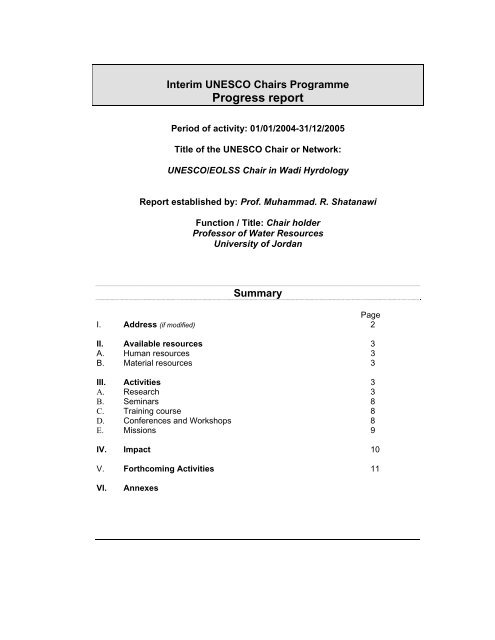
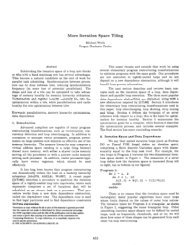
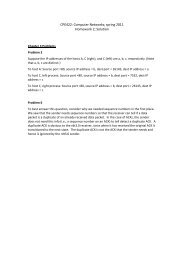
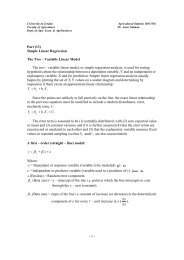
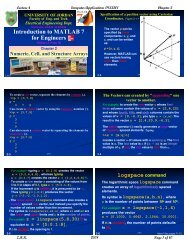
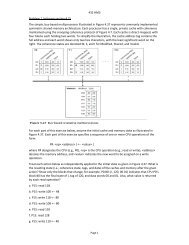


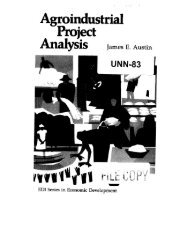
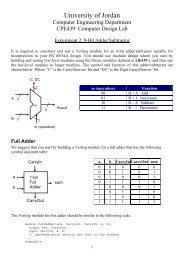
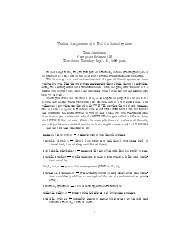

![Problem 1: Loop Unrolling [18 points] In this problem, we will use the ...](https://img.yumpu.com/36629594/1/184x260/problem-1-loop-unrolling-18-points-in-this-problem-we-will-use-the-.jpg?quality=85)
